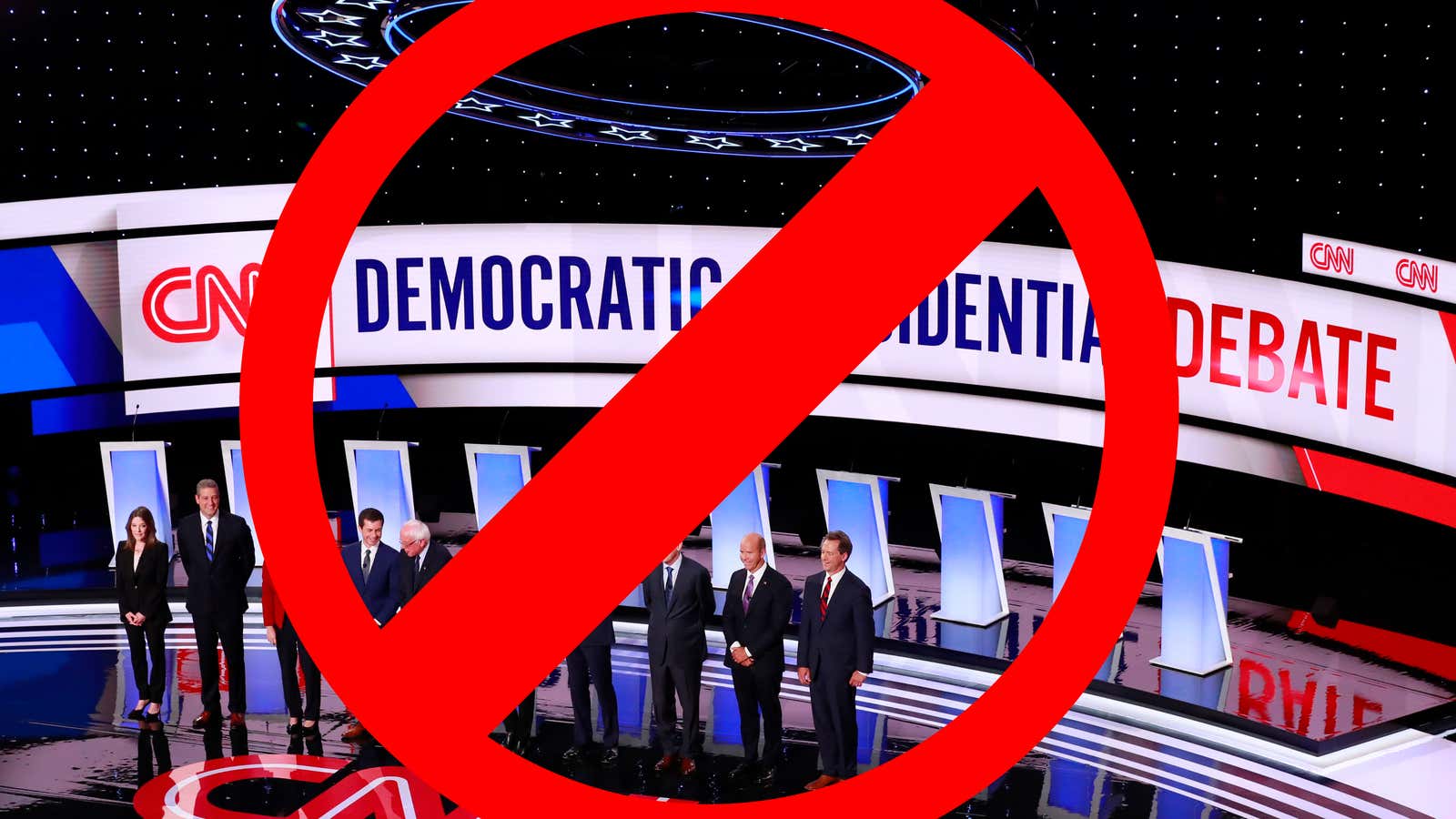This week, all 3,972 Democratic presidential hopefuls are engaged in a televised presidential debate, our society’s best impression of the Hunger Games. There are endless guides online telling you how to watch the debates, “even if you don’t have CNN,” which is both moderating and broadcasting them.
By answering some common questions, this step-by-step guide will take you through the more noble goal of avoiding the debates altogether. Even if you watched the first round last night, there’s hope for you yet.
What’s the first thing I should do?
Glad you asked. The first step to not watching the Democratic debates is to close your eyes and take a deep, long breath, paying attention to how the air filling your lungs changes the way your body feels. If any political thoughts enter your mind—of Bernie Sanders, Elizabeth Warren, tax policy, immigration, impeachment, and so on—don’t resist, but notice them and let them drift by.
When are the debates?
No idea.
Shouldn’t I be watching them? Aren’t they, like, important?
Not really. It will be several months before any actual primary votes are cast, and by then a) political situations will have changed and b) most of the wacky comedic-relief candidates will have been slain.
What if I’m really bored and watching the debates seems like a thing I could do to pass the time?
A much more enjoyable way to pass the time would be to put the debates on mute and play Nyan Cat – 10 HOURS [ BEST SOUND QUALITY ] 4K UHD ULTRA HD in the background.
For social reasons I might need to act like I watched the debates even if I didn’t. How can I do that?
Luckily every publication produces two articles for a debate: “How to watch the debate” and “Winners and losers from the debate.” To pretend that you watched, you can either A) read one of those “What happened” articles or B) use stock phrases that describe the candidates regardless of the context. Just put them in past tense so it sounds like you are specifically referring to the debate. For example, “John Delaney looked kind of like a thumb” or “Who the hell was that Andrew Yang guy?” or “Pete Buttigieg sounded good but I have no idea what he actually said” or “Why was Bernie so angry?”
You also have an option C, which involves shaming your peers who did watch the debates for buying in to and propping up a media-industrial complex that artificially constructs dramatic- and important-seeming events to exploit our naive human brains for profit.
(I recommend option A.)
Should I feel bad if instead of watching the debates I get very high and play Fire Emblem: Three Houses, which, I mean, just came out?
No.
All things being equal, isn’t it better to have more information about our political situation rather than less?
The answer here lies in Chapter Four of Zhuangzi 1, a foundational book of Daoism, in which the author relates a conversation between Confucius and his disciple, Yan Hui.
Confucius said, “You must fast! Let me tell you. To have something in mind and then go out and do that thing—do you think this is a simple matter? Majestic Heaven does not accommodate those who look on this as easy.”
Yan Hui said, “My family is poor, and I have had no wine or meat for many months. Can this be considered fasting?”
Confucius said, “That’s the fasting you do for a religious sacrifice. It is not the fasting of the mind.”
Yan Hui said, “What is the fasting of the mind?”
Confucius said, “If you merge all of your intentions into a singularity, you will come to hear with the mind rather than the ears. Further, you will come to hear with the vital energy rather than with the mind. For the ears are halted at what they hear. The mind is halted at whatever verifies its preconceptions. But the vital energy is an emptiness, a waiting for the presence of beings. The Course alone is what gathers in this emptiness. And it is the emptiness that is the fasting of the mind.”
What if I’m just watching the debates ironically and don’t really care about them?
That’s worse.
